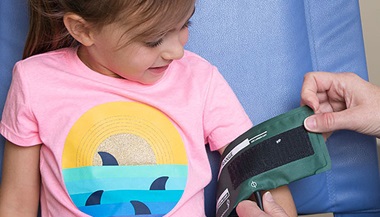How to Avoid Common Kids Injuries in the Summer
Featured Expert
Common Summer Injuries in Kids - On Call for All Kids
Summer can be a fun time for children with more free time and outdoor activities. With more activities, injuries can also occur at a higher rate. Danielle Mercurio, D.O., a pediatric emergency medicine physician at Johns Hopkins All Children’s Hospital, shares some of the top injuries seen in our Emergency Center each summer and how parents help prevent these injuries.
Water Safety and Preventing Drownings
Watch kids when they are in or around water. Keep young children and weak swimmers within arm’s reach of an adult. Make sure more experienced swimmers are with a partner every time. Choose a Water Watcher. When there are several adults present, choose one to be responsible for watching children in or near the water for a certain period of time, such as 15 minutes. After 15 minutes, select another adult to be the Water Watcher.
Teach children how to swim. Every child is different, so enroll children in swim lessons when they are ready. Consider their age, development and how often they are around water.
Learn CPR and be ready in case of an emergency.
Sunburns
Exposure to the sun during daily activities and play causes the most sun damage. Overexposure to sunlight before age 18 is most damaging to the skin. UV rays are strongest during summer months when the sun is directly overhead — normally between 10 a.m. and 2 p.m.
Block the sun's rays using a SPF of 15-30 or higher sunscreen. Apply the lotion 30 minutes before going outside and reapply it often during the day. Use broad spectrum sunscreens that block the greatest amount of UVA and UVB rays.
Head injuries
The risk of a head injury is more common in the spring and summer months with popular outdoor activities such as bicycle riding, skating and skateboarding. Parents should seek medical attention for their child should any of the following occur after a head injury:
- Vomiting
- Alteration in mental state
- Increased irritability, fussiness
- A seizure
- Weakness in parts of the body
- Bad headache
Wearing a helmet can prevent brain injuries and should become a habit. Properly-fitted helmets can reduce the risk of head injuries by at least 45 percent.
Trampolines
Trampoline jumping poses a high risk of injury for children. The activity can result in sprains and fractures in the arms or legs — as well as head and neck injuries. If you allow your child to use a trampoline, follow these important safety rules:
- First and foremost, always have adult supervision when children use the trampoline.
- Use safety nets and pads. Cover the trampoline's frame, springs and surrounding landing surfaces.
- Place home trampolines at ground level. A fall from a higher surface increases the risk of injury.
- Make sure the trampoline is set a safe distance from trees and other hazards.
- Allow only one person to use the trampoline at a time.
- Don't allow flying somersaults or other potentially risky moves on the trampoline without supervision, instruction and proper use of protective equipment such as a harness.
- Don't allow unsupervised jumping. If you use a trampoline ladder, always remove it after use to prevent unsupervised access by children.
Fireworks
Holidays like the Fourth of July can be fun times with great memories. But make sure everyone knows about fireworks safety. If not handled properly, fireworks can cause burns and eye injuries in kids and adults. The best way to protect your family is not to use any fireworks at home — period. Attend public fireworks displays, and leave the lighting to the professionals.
Barbecue and Grilling
Make sure your children stay a safe distance from the grill outside. Make it a point to:
- Keep children and pets away from the grill area by declaring a 3-foot "kid-free zone" around the grill.
- Keep all matches and lighters away from children. Teach your children to report any loose matches or lighters to an adult immediately.
- Be aware of charcoal that may still be hot and fire pits. They can burn children even when there is not a fire.
- Always supervise children around outdoor grills.






